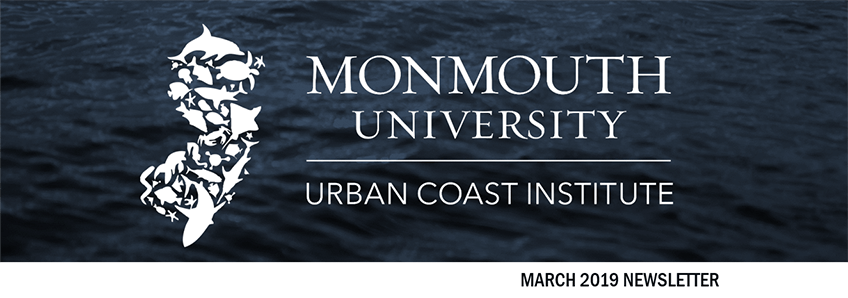
Climate Change, Coasts & Communities Symposium April 17-18 at Monmouth
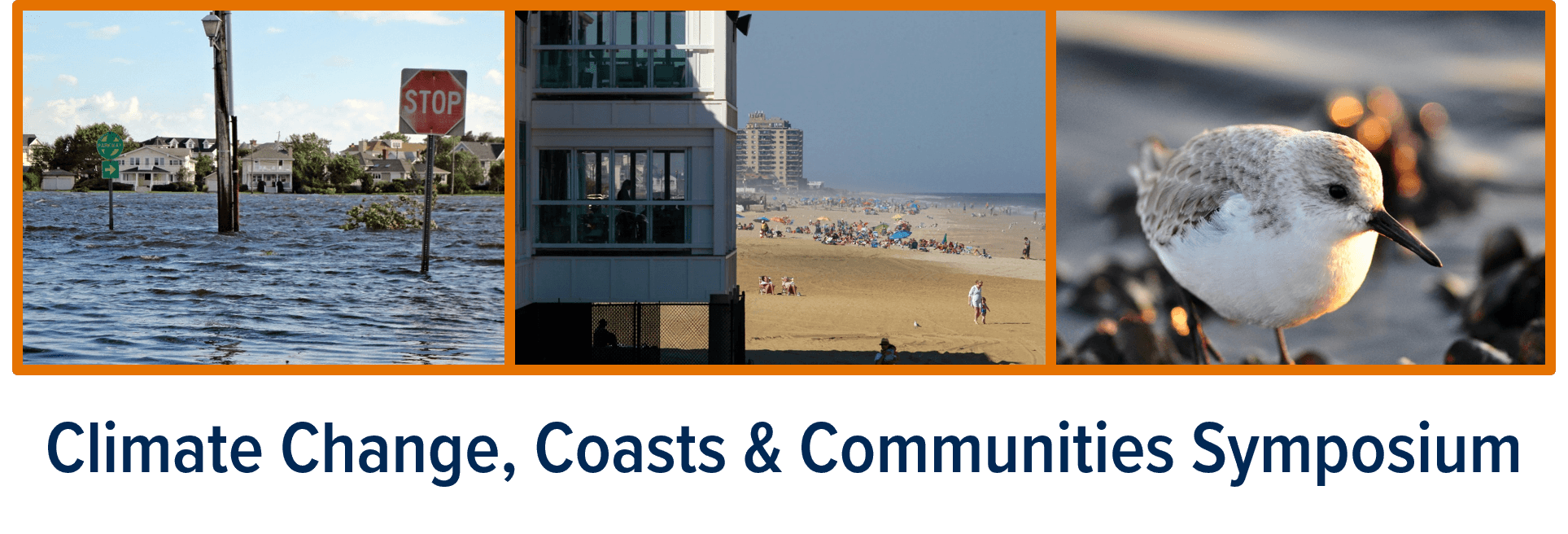
Leading experts from around the world in the areas of climate change adaptation law and science will assemble at Monmouth University on April 17-18 for the Climate Change, Coasts & Communities Symposium.
With the “new normal” of increased storm events, flooding, sea level rise and coastal erosion being caused by climate change, the event will focus on lessons from other states and abroad that can help New Jersey navigate the challenges. Discussion topics will include climate change impacts to voiceless communities, including future generations, wildlife and natural resources; the public health dimensions of coastal adaptation; and scientific strategies to combat climate change-induced factors that are harming marine and coastal ecosystems.
Keynote speakers include Global Ocean Forum President Biliana Cicin-Sain, University of Tasmania Faculty of Law Professor Jan McDonald and University of Utah S.J. Quinney College of Law Professor Robin Craig. The two-day symposium will kick off with a panel of Monmouth University students presenting their research on issues including the transfer of development rights and easements to improve coastal resilience and the threats extreme weather events pose to drinking water supplies.
For registration and more information, visit monmouth.edu/climate-coasts-communities or contact Professor Randall Abate at rabate@monmouth.edu. The event is free for Monmouth University students and employees (registration required), $35 for members of the public and $25 for Monmouth alumni and non-Monmouth students. The admission cost covers an opening night reception, Thursday continental breakfast and lunch, and refreshments.
The event is being hosted by Monmouth University’s Urban Coast Institute, Wayne D. McMurray School of Humanities and Social Sciences, School of Science, Office of the Provost, Global Education Office, Department of Political Science and Sociology, and Youth Activists Group.
‘Our Ocean and Beaches: A Record of Success and New Challenges to Face’ Panel April 5 at Monmouth University
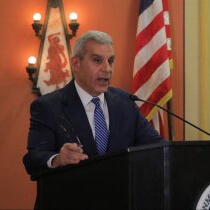
Former state Sen. Joseph M. Kyrillos will moderate “Our Ocean and Beaches: A Record of Success and New Challenges to Face,” on Friday, April 5 at 10 a.m. in the University’s Wilson Auditorium. This is the fourth and final panel discussion he will lead as the 2018-2019 Monmouth University Public Servant-in-Residence. Previous panel discussions in the public servant-in-residence series focused on pension and benefit reform, bridging the partisan divide, and jobs and the economy.
The panel will feature environmental experts including: Cindy Zipf, executive director of the nonprofit Clean Ocean Action; Chris Daggett, former regional administrator of the United States Environmental Protection Agency and commissioner of the New Jersey Department of Environmental Protection; and Tony MacDonald, director of the Monmouth University Urban Coast Institute.
Coastal Lakes Summit Focuses on Improving Health of Monmouth Co. Waters

Monmouth University kicked off a citizen science partnership with community groups, residents and municipal officials on March 15 to probe the causes of environmental problems impacting six Monmouth County coastal lakes.
Over 100 representatives of the communities surrounding Deal Lake, Lake Como, Sunset Lake, Sylvan Lake, Takanessee Lake and Wesley Lake gathered at the Edison Science Building to lay the groundwork for a new Coastal Lakes Observing Network (CLONet). Through the partnership, Urban Coast Institute (UCI) and School of Science staff and students will train community members to collect water quality samples and post their results to an online database, helping build a better understanding of the conditions in each lake.
The UCI is managing the two-year effort with the support of a grant from the Jules L. Plangere, Jr. Family Foundation. The funding supported the purchase of water quality sampling kits that will be supplied to participants from each of the communities.
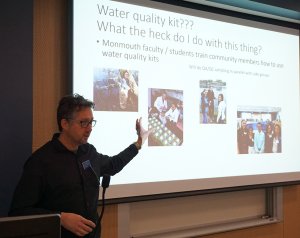
Endowed Associate Professor of Marine Science Jason Adolf will work with a team of students to analyze and ground truth the data. CLONet will establish a system for what types of data will be collected (for example, temperature, salinity, pH), where and how frequently sampling will take place.
“I am a scientist and I love science, but this is not all about science,” Adolf told participants at the Coastal Lakes Summit. “It’s about local knowledge and bringing it all together to build solutions.”
According to School of Science Assistant Dean John Tiedemann, CLONet’s roots trace back to another coastal lakes meeting that was convened at Monmouth a decade ago. At the time, there was a consensus that the county’s coastal lakes suffered from a common set of problems, but there was a vacuum in terms of any central agencies responsible for addressing them. Tiedemann noted there were discussions about launching an initiative like CLONet in 2010, but Superstorm Sandy knocked the momentum off track and prompted the communities to re-evaluate their lakes’ needs. The latest Coastal Lakes Summit was the third event of its kind held at Monmouth since 2008.
Longtime Issues
Monmouth County’s coastal lakes have historically been important resources for their communities, first as drinking water sources for early settlers, and later as focal points for tourism and recreation, Princeton Hydro President Stephen Souza said. Those that connect to the ocean are also critical spawning grounds for anadromous fish. However, these ecosystems have been degraded due to pollution, algae blooms and invasive species.
Many of the lakes are plagued by a process called eutrophication. According to Souza, the problem occurs when there are blooms of cyanobacteria (also known as blue-green algae), a biologically adept organism that thrives on nitrogen from the atmosphere and organic phosphorous compounds carried into the water by runoff. Cyanobacteria can block sunlight needed by other plant life but don’t mind low-light conditions themselves. They are rejected as food by filter feeders and zooplankton, he said.
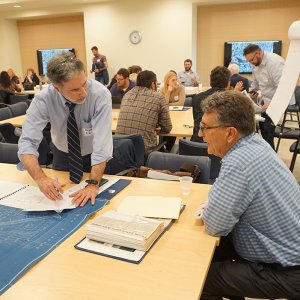
Heavy rain events can flood the waters with nutrients for these cyanobacteria, causing a sudden explosion in their populations. The organisms have been known to quickly sap out all of the oxygen in the water, causing fish and other organisms to die off. Common nutrient sources include lawn fertilizers, septic leaks and waterfowl feces.
“One pound of phosphorous can stimulate and sustain 1,000 pounds of algae,” said Souza, a member of the UCI’s Advisory Committee. “That’s a lot of primary production.”
The good news is, a eutrophic lake is not a dead lake, Souza said. Measures such as bolstering vegetation along waterlines and reducing and pre-treating runoff can “put lakes on a diet” and nurse them back to better health, he said.
Participants held a series of breakout discussions focused on the specific needs and issues facing their respective lakes, as well as next steps. Community workshops will be held in the lake areas under the guidance of Monmouth faculty, staff and students to mentor each community group on sampling techniques, and further discuss restoration plan development and implementation.
Additional Resources
For more information, email UCI Associate Director Tom Herrington, CLONet project manager, at clonet@monmouth.edu. Presentations and materials from the Coastal Lakes Summit are available below.
- Meeting agenda
- John Tiedemann presentation
- Jason Adolf presentation
- Stephen Souza presentation
- Lake Como presentation
- Sunset Lake presentation
- Takanassee Lake presentation
- Coastal lakes ranking chart
- Photos from Summit
First Mid-Atlantic Ocean Forum Held at Monmouth U.
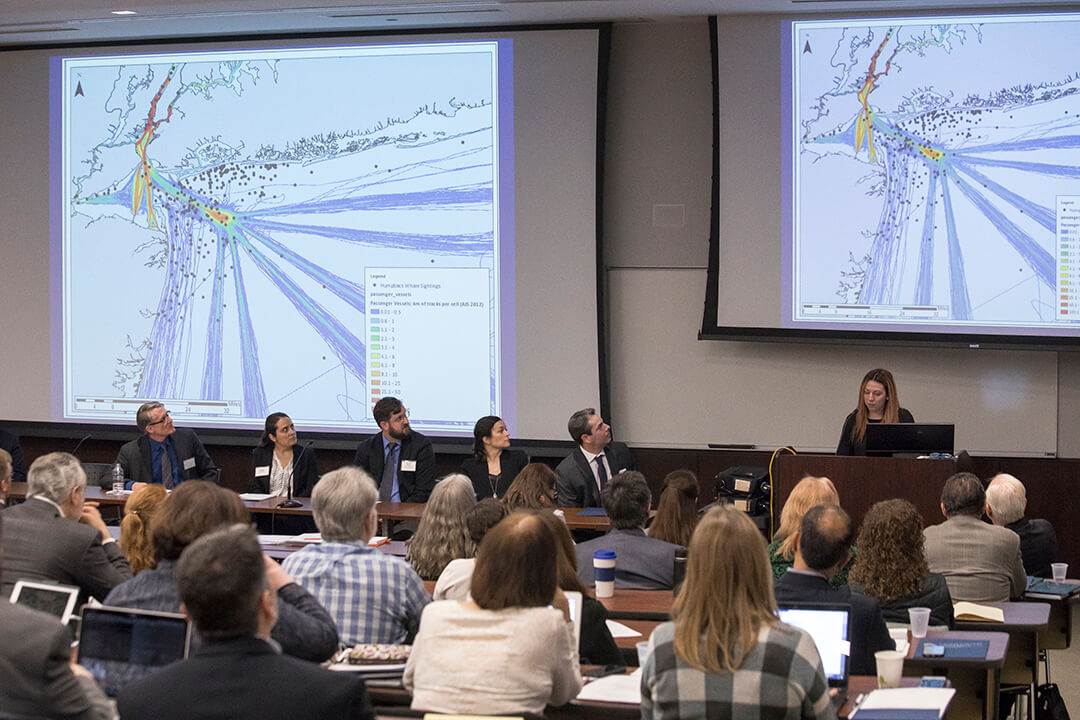
The Mid-Atlantic Committee on the Ocean (MACO), a consortium of state and federal agencies, fishery management officials and tribal entities, convened its inaugural forum at Monmouth University on March 20. The Mid-Atlantic Ocean Forum was the first of what is expected to be an annual series of events that provide industry experts, government officials and members of the public an opportunity to collaborate and exchange information on marine science and policy issues.
The New Jersey Department of Environmental Protection’s Liz Semple, chair of the Mid-Atlantic Regional Council on the Ocean (MARCO), welcomed the nearly 200 attendees to the forum.
The UCI assisted with the event’s organization and facilitation. UCI Director Tony MacDonald emceed the proceedings, while Associate Director Tom Herrington and Communications Director Karl Vilacoba led panel discussions on the topics of offshore sand/sediment resources and regional ocean data priorities, respectively.
Vilacoba, who serves as project manager and communications lead for the Mid-Atlantic Ocean Data Portal development team, offered a preview of the data products and tool upgrades planned for 2019. Among the many items highlighted were new maps depicting party/charter boat fishing hot spots in the region, fish and marine mammal distributions, potential sand resource sites and the most current offshore wind planning areas. He also unveiled a new tool that allows users to animate map layers showing the same data types at different time intervals, demonstrating with monthly maps of vessel traffic patterns in the Mid-Atlantic.
“This is going to make the viewing of any temporal data on the Portal a whole lot more user friendly,” he said. “In the year ahead we’ll apply it to some of our marine life, oceanography and commercial fishing data, and we think it’s going to be very good and revealing when you view it that way.”
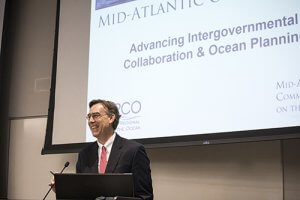
Deerin Babb-Brott, the White House Office of Science and Technology Policy’s principal assistant director for oceans and environment, provided an update on the implementation of President Trump’s 2018 executive order on ocean policy. He said that one of its key directives was for federal agencies to work with regional entities throughout the country to compile a list of their top ocean data needs and identify federal resources that could help fulfill them. Babb-Brott said the administration is committed to providing funding for portal projects and regional ocean partnerships like those in the Mid-Atlantic and Northeast.
“You’ll see in fiscal year 2019, Congress appropriated dollars to support regional data portals and regional capacity,” Babb-Brott said. “It’s small money to start, but it gets the ball rolling. And it’s a demonstration that with an EO and administration support, we also have a relationship with the Hill that allows us to have a constructive conversation to all of your benefit.”
Participants could choose to join any of six break-out sessions focused on the topics of ocean acidification, recreational/non-consumptive ocean use, healthy ocean indicators, marine debris, maritime commerce and navigation, and science and research priorities. The takeaways from each session were recorded and presented to the full group of forum attendees during a wrap-up discussion that concluded the event.
To view an agenda from the meeting and learn more about regional ocean planning, visit the MARCO website at midatlanticocean.org. Videos of the forum discussions will be available on the website soon.
View our album of photos from the event.
UCI Announces Spring Grant Recipients, Opportunities for Summer and Fall
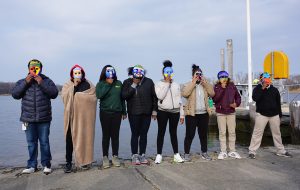
The UCI has awarded grants for five faculty and student research efforts at Monmouth University in the spring semester and is now accepting applications for summer and fall opportunities.
Funding is provided through UCI Scholars Program, which offers competitive grant opportunities to students and faculty of all disciplines whose work would advance core elements of Monmouth’s Strategic Plan and support the UCI’s mission. In total, three Faculty Enrichment Grants and two Mini-Grants were approved for spring applicants representing six departments within the University.
Spring Faculty Enrichment Grants
Coastal Cultures for the Elementary Learner
Faculty: Geoffrey Fouad, GIS Program, with Communications graduate student and Production Services Director Erin Fleming
Videos, graphics and other content will be developed for an educational story map geared toward elementary school students that explores the differences and similarities in coastal cultures around the world.
Development of an Art & Ecology Residency Experience for Monmouth Students at Joya, Velez-Blanco, Spain
Faculty: Kimberly Callas, Dept. of Art and Design
Callas will continue to build on her nature-inspired Discovering the Ecological Self project through an arts residency at Spain’s Joya: arte + ecología.
Using Fractal Patterning to Explore the Coastline and the Human Body
Faculty: Karen Pesce, Dept. of Biology, and Sandra Zak, Dept. of Mathematics
Funding will support the development of an interdisciplinary curriculum module focused on the study of fractal patterns in nature, including in coastal environments.
Spring Mini-Grant Awards
Integrating Calligraphy into Interactive Design Curriculum Focused on Coastal Challenges
Faculty: Jing Zhou, Dept. of Art and Design
Tools and supplies will be purchased for students creating calligraphy art focused on phrases that reflect environmental and societal challenges in coastal regions.
Panel Chair and Presentation at 44th Annual Caribbean Studies Association Conference
Faculty: Paul Humphrey, Dept. of World Languages and Cultures
Humphrey will lead a panel discussion that explores how the sea unites and divides Caribbean cultures in literature.
Apply Now for Funding
Monmouth University students and faculty of all disciplines are invited to apply now for summer and fall UCI Scholars funding opportunities.
Summer grants available include:
- Heidi Lynn Sculthorpe Summer Research Grants to support student research projects in natural and social science, humanities, economic and public policy research involving faculty and students from any School or Department at Monmouth University. Proposals are due May 1.
Fall grants available include:
- Faculty Enrichment Grants for the enhancement of existing curriculum, new curriculum development, research and scholarship, and team-teaching opportunities. Deadlines are April 30 for the summer semester and June 30 for the fall semester.
- Mini-Grants are also available to faculty and students for conference fees, symposia, guest speaker honoraria, equipment and supplies, and other needs to be determined on a case-by-case-basis. Applications can be submitted at any time and are reviewed on a rolling basis. Awards range from $250 to $500 depending on the availability of funds.
Those interested may apply via the UCI Funding Opportunities page on the MyMU Portal (Monmouth University sign-in credentials required). For more information, contact UCI Associate Director Dr. Thomas Herrington at (732) 261-5588 or therring@monmouth.edu.
These opportunities have been made possible through the generous support of Santander Bank and many other corporate and private donors. If you would like to make a tax-deductible gift to the Urban Coast Institute, please use our Give a Gift Now contribution form.
Professor and Communication Students Study Gentrification, Record Residents’ Perspectives on Asbury Park’s History
Monmouth University Associate Professor Deanna Shoemaker and her communication students are collaborating with community leaders and residents to generate and record oral histories of longtime Asbury Park, New Jersey, residents and youth as part of a service learning and community engagement (SLCE) project. The results of this ongoing project will eventually be shared with members of the coastal community in various ways.
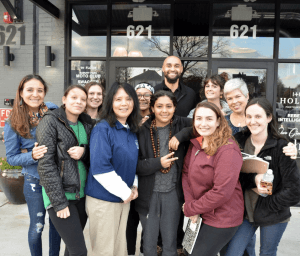
With the support of an Urban Coast Institute grant, Shoemaker and her students have partnered with the local nonprofit KYDS (Konscious Youth Development and Service) in Asbury Park. This organization was founded in 2014 by Mychal Mills and Rodney Salomon, both Monmouth alumni, and their mission is to prepare and create future leaders through holistic interventions and mindful youth development.
Graduate students in Shoemaker’s fall 2018 “Communication, Culture, and Community” class attended KYDS’ community events (gentle yoga, meditation, and open mics), met with various community leaders to learn about the history of Asbury Park, and co-hosted creative expression workshops with KYDS youth members at MU’s Lakehouse Music space in Asbury Park. Students also conducted research that helped prepare them to interview members of KYDS on topics such as gentrification, displacement, and positive youth development.
Since Asbury Park’s genesis as a beach tourism resort in the late 1800s, its east side has historically been the wealthier of the two areas, with hospitality businesses that were once exclusively geared toward white customers and off-limits to the black patrons who lived in neighborhoods west of the railroad tracks. Tensions caused by these disparities contributed to a 1970 riot that resulted in the destruction of buildings and a near abandonment of the waterfront district. The city is now in the midst of an economic resurgence that has brought about an overall rise in property values but also gentrification issues, as the progress has made the city less affordable for longtime residents.
For her graduate students in communication who study community-based research methods and undergraduate students in performance and communication-based courses who study and present cultural stories from their own and others’ lives, Shoemaker hopes that service learning teaching and learning methods offer more applied experiences of the value of civic engagement and social justice. Listening to and helping to document stories from longtime local residents may contribute to deeper understanding and unity within our diverse and dynamic communities.
“Service learning projects can offer students meaningful opportunities to interrogate their own assumptions, build rapport and trust, practice empathic listening, and mutually discover ethical and sustainable ways to partner with fellow community members and organizations to collaboratively address community challenges,” Shoemaker said.
The longer term goals of this project are to identify and interpret key themes in residents’ narratives, support residents in developing initiatives that help to address various challenges, and encourage greater community trust and honest discourse. The results of this multi-year service learning project will be shared through video, audio podcasting, public performances, and various forms of publication.
UCI Director Named to National Academies Ocean Studies Board
The National Academies of Sciences, Engineering, and Medicine has appointed UCI Director Tony MacDonald as a member of its Ocean Studies Board (OSB). He will begin his three-year term at the body’s April 23-25 meeting in Washington, DC.
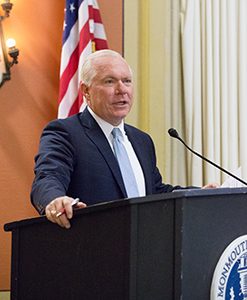
The OSB explores the science, policies and infrastructure needed to understand, manage and conserve coastal and marine environments and resources. In addition to exercising leadership within the ocean community, the OSB undertakes studies at the request of federal agencies, Congress or other sponsors, or upon its own initiative.
Among the many research areas the OSB has recently focused on are the ocean’s role in the global climate system, technology and infrastructure needs for exploration, ocean-related aspects of national security, and fisheries science, management and policy.
“The Ocean Studies Board’s members include leading ocean scientists from the nation’s premier academic and research institutions, as well as distinguished private and public sector marine science and policy leaders,” MacDonald said. “This appointment is not only a professional and personal honor, but also a recognition of the continued growth and importance of Monmouth University and the Urban Coast Institute’s marine programs.”
MacDonald has served as the director of the UCI since its launch in 2005. From 1998-2005, he was the executive director of the Washington, DC-based Coastal States Organization (CSO), which represents the interests of the governors of the nation’s 35 coastal states and territories on coastal and ocean policy matters. Prior to joining CSO, MacDonald was the special counsel and director of environmental affairs at the American Association of Port Authorities, where he represented the International Association of Ports and Harbors at the International Maritime Organization on negotiations on the London Convention.
MacDonald has also practiced law with a private firm in Washington, DC, working on environmental and legislative issues, and served as the Washington, DC, environmental legislative representative for the mayor of New York City.
Gaffney Inducted into Naval Oceanography Hall of Fame
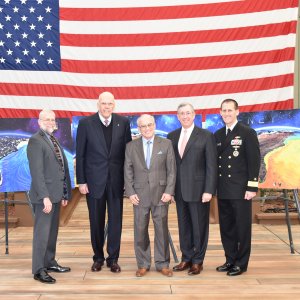
Monmouth University President Emeritus and UCI Ocean Policy Fellow Paul G. Gaffney II was a member of the first class of three inductees to the Naval Meteorology and Oceanography Hall of Fame at a recent ceremony at the John C. Stennis Space Center in Mississippi.
Vice Adm. (ret.) Gaffney served as commander of the Naval Meteorology and Oceanography Command (NMOC) from 1994 to 1997. He became the first naval oceanographer to attain the rank of vice admiral. Gaffney is credited with attaining the visionary goal of making Naval Oceanography a world-class supercomputing facility and delivering three oceanographic survey ships into the operational fleet—USNS Pathfinder, USNS Sumner and USNS Bowditch.
Read the full story in Monmouth Now.
Abate Discusses ‘Voiceless’ Victims of Climate Change on Public Radio
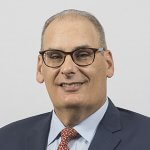
Professor Randall S. Abate (Rechnitz Family/UCI Endowed Chair in Marine and Environmental Law and Policy) discussed his upcoming book Climate Change and the Voiceless: Protecting Future Generations, Wildlife, and Natural Resources on the Healthy Planet public radio show. You can listen to the discussion and also read about his recent book talks at Yale University, the University of Miami Law School, and to students in Washington, DC.
Final Report Released from Monmouth-Rockefeller eDNA Conference
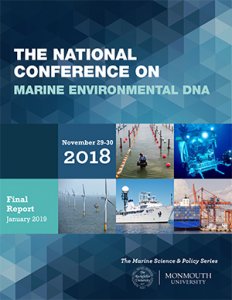
A final report has been released for the National Conference on Marine Environmental DNA (eDNA), co-organized by Rockefeller and Monmouth universities in November in New York City. The document concludes that “marine eDNA is already a surprisingly reliable, feasible, and affordable ocean observation technology ready for rapid adoption and poised for giant steps forward. In short, it works….Get going.” Download the final report from the event or view a news release summarizing its findings.
